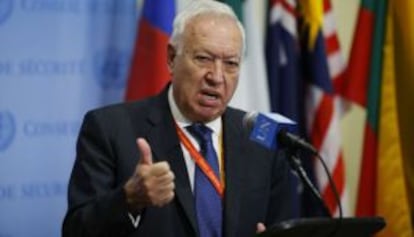Spain “a winner” with 2003 Iraq War, claims ex-PM Aznar in a letter
New book includes thoughts by leader, who joined Blair and Bush in support of invasion

Of the three world leaders who came together in the Azores Islands to publicly defend the Iraq War in 2003 – US President George W. Bush, Britain’s then-PM Tony Blair and the former Spanish Prime Minister José María Aznar – only the latter continues to justify an act whose incendiary results are still being felt across the globe.
“In terms of influence and international support for our goals, Spain emerged a winner,” writes the former conservative prime minister in a letter to current Foreign Minister José Manuel García-Margallo.
In his 2010 memoirs, as well as in subsequent public statements, Bush admitted to the chain of errors that led to the Iraq invasion, beginning with the absence of the weapons of mass destruction that allegedly triggered the military action in the Middle East.
The Spanish people did not understand, nor was anyone able to satisfactorily explain, the reason for that decision”
Foreign Minister José Manuel García-Margallo
Just a week ago, Blair acknowledged that the planners of that attack did not foresee the consequences of their decision, and even admitted to a certain degree of responsibility for the chaos currently gripping the region, and which has facilitated the rise of Islamic State (ISIS).
Instead, Aznar – who governed Spain with the Popular Party between 1996 and 2004 – claims that he only did “what the majority of European countries” were doing, but that Spain had a higher profile because it held a non-permanent seat at the United Nations Security Council.
He also alleges that Spain “did not participate in any war” and that “no Spanish soldier was in Iraq for a single day without United Nations backing.”
Aznar is referring to the fact that by the time Spanish troops arrived on site, the UN had already approved a resolution defining the foreign powers as occupying forces with their corresponding obligations; he also means that Madrid’s support for the invasion was more political in nature than military.
Aznar says that he supported the Iraq invasion “out of a pro-Atlantic conviction, because it was strategically good for Spain, and out of a basic sense of political reciprocity: you cannot ask a friend [Bush] for help, and later deny that same friend your aid when he requests it.”
All skies lead to Spain
The former statesman’s letter, dated August 12, is part of a book by the current foreign minister titled Todos los cielos conducen a España. Cartas desde un avión (or, All skies lead to Spain: Letters from inside an airplane).
The book includes 44 letters written by García-Margallo to political leaders, experts and diplomats on the subject of foreign affairs, and their corresponding replies.

In his own letter to Aznar, García-Margallo writes: “You know that I don’t share the decision that the government made at the time [on the subject of Iraq] The Spanish people did not understand, nor was anyone able to satisfactorily explain, the reason for that decision.”
García-Margallo also wrote about Iraq to Spain’s next prime minister, the Socialist José Luis Rodríguez Zapatero, accusing him of breaking the consensus on Spain’s foreign policy by deciding to pull Spanish troops from Iraq.
But Zapatero replied that it was Aznar who created disagreement by pushing Spain into a war despite opposition from many other European, Arab and Latin American countries.
“The withdrawal of troops, besides honoring a campaign pledge, represented the end of that disagreement.”
English version by Susana Urra.
Tu suscripción se está usando en otro dispositivo
¿Quieres añadir otro usuario a tu suscripción?
Si continúas leyendo en este dispositivo, no se podrá leer en el otro.
FlechaTu suscripción se está usando en otro dispositivo y solo puedes acceder a EL PAÍS desde un dispositivo a la vez.
Si quieres compartir tu cuenta, cambia tu suscripción a la modalidad Premium, así podrás añadir otro usuario. Cada uno accederá con su propia cuenta de email, lo que os permitirá personalizar vuestra experiencia en EL PAÍS.
¿Tienes una suscripción de empresa? Accede aquí para contratar más cuentas.
En el caso de no saber quién está usando tu cuenta, te recomendamos cambiar tu contraseña aquí.
Si decides continuar compartiendo tu cuenta, este mensaje se mostrará en tu dispositivo y en el de la otra persona que está usando tu cuenta de forma indefinida, afectando a tu experiencia de lectura. Puedes consultar aquí los términos y condiciones de la suscripción digital.









































